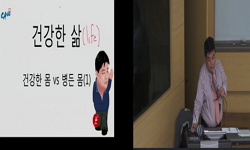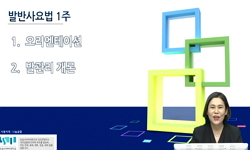This study is intended to identify the longitudinal effects of influencing factors on bereaved elderly women’s healthy life. A total of 860 bereaved elderly women among 7,486 panel members for the KLoSA of the fourth year were selected as the subjec...
http://chineseinput.net/에서 pinyin(병음)방식으로 중국어를 변환할 수 있습니다.
변환된 중국어를 복사하여 사용하시면 됩니다.
- 中文 을 입력하시려면 zhongwen을 입력하시고 space를누르시면됩니다.
- 北京 을 입력하시려면 beijing을 입력하시고 space를 누르시면 됩니다.

사별 여성노인의 건강한 삶에 미치는 영향 요인 연구 = A Study on the Effects of Influencing Factors on Bereaved Elderly Women’s Healthy Life
한글로보기부가정보
다국어 초록 (Multilingual Abstract)
This study is intended to identify the longitudinal effects of influencing factors on bereaved elderly women’s healthy life. A total of 860 bereaved elderly women among 7,486 panel members for the KLoSA of the fourth year were selected as the subjects of this study. For the subjects, variables including social class consciousness, economic status, parent-child relationship, and healthy life were determined, and the Latent Growth Model was analyzed using SPSS and AMOS. As a result of unconditional model analysis, satisfaction on healthy life of bereaved elderly women gradually increased over time and showed a difference between its initial level and variations. In the conditional model analysis, when the initial values of healthy life predictor variables were added to predictor variables, the result showed that the greater the social class consciousness, economic status, and parent-child relationship, the higher the satisfaction on healthy life, and that the variation rate of the increase in satisfaction on healthy life decreased over time. Therefore, it is necessary for regional welfare and medical institutions, religious and civic organizations, and colleges and educational institutions to strengthen the establishment of a mutual community cooperation and then expand the support service for the enhancement of satisfaction on education programs, economic status, and parent-child relationship that are necessary for the positive change of social class consciousness of bereaved elderly women.
국문 초록 (Abstract)
본 연구는 사별 여성노인의 건강한 삶에 미치는 영향 요인의 종단적 영향력을 밝히고자 한 것이다. KLoSA 4차년도 패널7,486명 중 연구대상인 사별 여성노인 860명에 대해 사회적 계층의식, 경제...
본 연구는 사별 여성노인의 건강한 삶에 미치는 영향 요인의 종단적 영향력을 밝히고자 한 것이다. KLoSA 4차년도 패널7,486명 중 연구대상인 사별 여성노인 860명에 대해 사회적 계층의식, 경제상태, 자녀관계, 건강한 삶 변인을 선정, SPSS, AMOS를 사용해 잠재성장모형을 분석하였다. 무조건부모형의 분석 결과, 사별 여성노인의 건강한 삶에 대한 만족은 시간의 흐름에 따라 점차 증가했으며, 초기 수준과 변화 과정에서 차이를 나타냈다. 그리고 조건부모형의 분석에서 건강한 삶을 예측하는 변인들의 초기치를 예측변수로 투입한 결과, 사별 여성노인의 사회적 계층의식이 높고 경제상태, 자녀관계가 좋을수록 건강한 삶의 만족감은 높았고 시간이 지남에 따라 건강한 삶의 만족에 대한 증가 폭의 변화율은 감소하였다. 이에 지역사회의 복지 및 의료기관, 종교 및 시민단체, 대학 및 교육기관에서는 상호적인 커뮤니티 망 구축을 강화하여 사회적 계층의식의 긍정적인 전환에 요구되는 교육과 경제상태, 자녀관계 만족 향상을 위한 지원서비스를 확대해야 한다.
참고문헌 (Reference)
1 서연숙, "중고령자의 사회경제적 지위에 따른 건강수준 연구" 한국노년학회 31 (31): 1135-1153, 2011
2 장수지, "중·노년기 배우자 사별 전후의 사회적 관계망 변화에 대한 종단연구" 한국노년학회 31 (31): 1083-1101, 2011
3 최현수, "우리나라의 노인빈곤 동향 및 빈곤구성에 대한 연구" 한국노년학회 23 (23): 143-160, 2003
4 정명숙, "연령과 삶에 대한 만족도" 한국심리학회 산하 한국발달심리학회 18 (18): 87-108, 2005
5 최령, "소득계층과 주관적 계층인식에 따른 의료이용 : 『한국의료패널』자료를 중심으로" 한국보건사회학회 (33) : 117-139, 2013
6 이성규, "베이비부머의 삶의 만족도에 영향을 미치는 요인: 성별 차이를 중심으로" 한국디지털정책학회 12 (12): 73-86, 2014
7 박상규, "노인의 정신건강과 삶의 질 간의 관계" 한국건강심리학회 11 (11): 785-796, 2006
8 신용석, "노인의 자산수준이 삶의 만족도에 미치는 영향: 사회활동참여의 다중매개효과를 중심으로" 한국보건사회연구원 37 (37): 216-250, 2017
9 김미령, "노인의 성공적 노화 요소의 삶의 만족도 영향 연구: 성인자녀와의 관계를 중심으로" 한국가족사회복지학회 (57) : 159-182, 2017
10 배진희, "노인의 상실, 학대경험, 우울이 자살생각에 미치는 영향" 한국노인복지학회 (44) : 49-70, 2009
1 서연숙, "중고령자의 사회경제적 지위에 따른 건강수준 연구" 한국노년학회 31 (31): 1135-1153, 2011
2 장수지, "중·노년기 배우자 사별 전후의 사회적 관계망 변화에 대한 종단연구" 한국노년학회 31 (31): 1083-1101, 2011
3 최현수, "우리나라의 노인빈곤 동향 및 빈곤구성에 대한 연구" 한국노년학회 23 (23): 143-160, 2003
4 정명숙, "연령과 삶에 대한 만족도" 한국심리학회 산하 한국발달심리학회 18 (18): 87-108, 2005
5 최령, "소득계층과 주관적 계층인식에 따른 의료이용 : 『한국의료패널』자료를 중심으로" 한국보건사회학회 (33) : 117-139, 2013
6 이성규, "베이비부머의 삶의 만족도에 영향을 미치는 요인: 성별 차이를 중심으로" 한국디지털정책학회 12 (12): 73-86, 2014
7 박상규, "노인의 정신건강과 삶의 질 간의 관계" 한국건강심리학회 11 (11): 785-796, 2006
8 신용석, "노인의 자산수준이 삶의 만족도에 미치는 영향: 사회활동참여의 다중매개효과를 중심으로" 한국보건사회연구원 37 (37): 216-250, 2017
9 김미령, "노인의 성공적 노화 요소의 삶의 만족도 영향 연구: 성인자녀와의 관계를 중심으로" 한국가족사회복지학회 (57) : 159-182, 2017
10 배진희, "노인의 상실, 학대경험, 우울이 자살생각에 미치는 영향" 한국노인복지학회 (44) : 49-70, 2009
11 홍성희, "노인의 삶의 질과 영향요인에 관한 연구" 한국가족자원경영학회 20 (20): 89-108, 2016
12 김수희, "노인의 사회경제적 지위가 삶의 만족도에 미치는 영향: 공식적․비공식적 사회활동참여의 매개효과를중심으로" 한국노인복지학회 73 (73): 167-191, 2018
13 남석인, "노인의 계층인식이 자살충동에 미치는 영향과 스트레스와 주관적 건강인식의 이중매개효과" 한국보건사회연구원 36 (36): 121-150, 2016
14 이영애, "노인소비자의 인적자본 및 사회적 자본이 노동시장 참여와 삶의 질에 미치는 영향" 한국소비자정책교육학회 12 (12): 177-202, 2016
15 허준수, "노인들의 삶의 만족도에 대한 인과모형 연구: 유형별 사회참여활동의 매개효과를 중심으로" 한국콘텐츠학회 17 (17): 673-691, 2017
16 박기남, "노년기 삶의 만족도의 성별 차이" 한국노년학회 24 (24): 13-29, 2004
17 정진경, "노년기 부모-성인자녀간 지원유형에 관한 연구" 한국노년학회 32 (32): 895-912, 2012
18 차승은, "남녀의 가족 역할 점유와 건강 문제" 한국인구학회 29 (29): 167-194, 2006
19 이인정, "남녀노인의 우울, 삶의 만족에 대한 심리사회적 요인들의 영향의 차이에 관한 연구" 한국노인복지학회 (36) : 161-182, 2007
20 손정연, "결혼상태의 지속 및 변화가 노인의 건강에 미치는 영향 - 경제자원 및 사회적 관계망의 매개효과 검증 -" 한국가족사회복지학회 (35) : 5-40, 2012
21 L. A. Lillard, "Till death do us part : Marital disruption and mortality" 100 : 1131-1156, 1995
22 T. L. Hongerford, "The economic consequences of widowhood on elderly women in the united states and Germany" 41 (41): 103-110, 2001
23 J. Angel, "The economic consequences of widowhood for older minority women" 47 (47): 224-234, 2007
24 P. Sevak, "The economic consequences of a husband's death: Evidence from the HRS and AHEAD" 65 (65): 31-44, 2003
25 M. Manmot, "Status syndrome: A challenge to medicine" 295 (295): 1304-1307, 2006
26 P. Demakakos, "Socioeconomic status and health: The role of subjective social status" 67 (67): 330-340, 2008
27 L. F. Berkman, "Social epidemiology" Oxford University Press 137-131, 2000
28 B. Kathrin, "Resilient or at risk? A 4-year study of older adults who initially showed high or low distress following conjugal loss" 60B (60B): 67-73, 2005
29 B. F. Wilson, "Remarriages : a demographic profile" 13 (13): 123-141, 1992
30 N. E. Adler, "Relationship of subjective and objective social status with psychological and physiological functioning: Preliminary data in healthy. White women" 19 (19): 586-592, 2000
31 D. Dewit, "Physical distance and social contact between elders and their adult children" 10 : 56-80, 1998
32 M. H. Cantor, "Neighbours and friends : An overlooked resource in the informal support system" 1 : 434-463, 1979
33 J. K. Keicolt-Glaser, "Negative behavior during marital conflict is associated with immunological down-regulation" 55 : 395-409, 1993
34 C. Salmond, "NZiDep: A New Zealand index of socioeconomic deprivation for individual" 62 : 1474-1485, 2006
35 J. Lupton, "Marriage and the economy: Theory and Evidence from Advanced Industrial Societies" Cambridge University Press 129-152, 2003
36 L, Waite, "Marriage and family" Spinger 2005
37 H. Brockmann, "Love and death in Germany: The marital biography and its effect on mortality" 66 : 567-581, 2004
38 K. T. Kim, "Life satisfaction and socal support Network of the elderly living alone" 20 (20): 153-168, 2000
39 K. H. Han, "Korean care giver's perceived benefits and costs of the coresidence with the elderly parents" 39 (39): 129-143, 2001
40 M. W. Kraus, "Is the association of subjective SES and self-rated health confounded by negative mood? An experimental approach" 32 (32): 138-145, 2013
41 Koyano, W, "Hierarchical compensation in the social relationships of elderly community residents" 19 (19): 140-150, 1998
42 R. Wilkinson, "Health, hierarchy and social anxiety" 896 (896): 48-63, 1999
43 R. C. Mannell, "Encyclopedia of gerontology" Academic Press 1996
44 J. Mirowsky, "Education, social status, and health" Aldine Transaction 2003
45 K. L. Fingerman, "Do age differences in close and problematic family ties reflect the pool of available relatives?" 38 (38): 80-87, 2003
46 M. M. Rahman, "Correlates of socioeconomic status and the health of older people in the United Kingdom: A Review" 24 (24): 195-216, 2016
47 L. H. Levy, "Bereavement support groups: Who joins, who does not, and why" 20 : 649-662, 1992
48 K. F. Ferraro, "Aging, stress and health Bath" John Wiley & Sons 69-83, 1989
49 S. J. Han, "A study on factors related to healthy life of elderly women" 26-46, 2019
50 J. D. Kwon, "A study of factors influencing the life satisfaction of the aged" 20 (20): 61-76, 2000
동일학술지(권/호) 다른 논문
-
뇌교육 기반 인성프로그램이 초등학생의 자아존중감과 친구관계 향상에 미치는 효과
- 사단법인 인문사회과학기술융합학회
- 김창규
- 2019
- KCI등재
-
- 사단법인 인문사회과학기술융합학회
- 장혜진
- 2019
- KCI등재
-
관상동맥 조영술을 받는 대상자에게 음악요법이 미치는 효과
- 사단법인 인문사회과학기술융합학회
- 곽선경
- 2019
- KCI등재
-
간호대학생이 경험한 무례함, 임상실습스트레스가 진로정체감에 미치는 영향
- 사단법인 인문사회과학기술융합학회
- 양희모
- 2019
- KCI등재
분석정보
인용정보 인용지수 설명보기
학술지 이력
| 연월일 | 이력구분 | 이력상세 | 등재구분 |
|---|---|---|---|
| 2020 | 평가예정 | 신규평가 신청대상 (신규평가) | |
| 2019-12-01 | 평가 | 등재 탈락 (기타) | |
| 2019-01-01 | 평가 | 등재학술지 유지 (계속평가) |  |
| 2016-01-01 | 평가 | 등재학술지 선정 (계속평가) |  |
| 2014-01-01 | 평가 | 등재후보학술지 선정 (신규평가) |  |
학술지 인용정보
| 기준연도 | WOS-KCI 통합IF(2년) | KCIF(2년) | KCIF(3년) |
|---|---|---|---|
| 2016 | 0.33 | 0.33 | 0.32 |
| KCIF(4년) | KCIF(5년) | 중심성지수(3년) | 즉시성지수 |
| 0.33 | 0.32 | 0.407 | 0.14 |





 KCI
KCI 스콜라
스콜라






